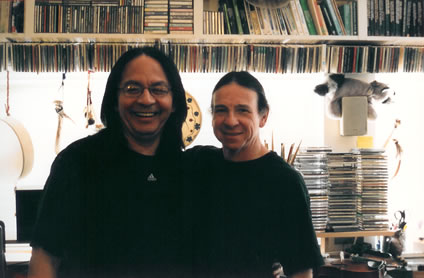 |
||||||
|
||||||
| "Hello.
My name is Tekahiónhake. I am wolf clan. My wife is Kaweienón:ni
and between us we have 7 children. This CD is called Rarennenhá:wi
(He carries a song) after my grandson because my wife and I are always
working towards helping our community to relearn our language. Kim and
Eddy Lawrence are two extremely creative and good minded people who
are helping us to revitalize our language. We give them much gratitude
for the wonderful work they are doing. I also give thanks to the many
children whom I’ve taught through the years and how they have
learned to sing my songs. I give thanks to the many people who are working
towards saving our languages. Our language is of most importance and
very beautiful. I encourage people to listen to my songs and to learn
to sing them. I acknowledge my sister Kasé:waien for the work
she is doing towards saving our language. "Tiorahkwáthe
my friend, it’s your fault I started singing. Big thank you and
much gratitude". This music also belongs to my children, our grandchildren
and the generations yet to come. I hope Rarennenhá:wi will learn
my songs and carry them on."
The thirteen songs on "Rarennenhá:wi" were selected from scores of recordings that Teddy and I have made over the course of the past three years. The earliest ones were recorded in casual sessions at various impromptu locations around Ahkwesáhsne with sundry drop-in musicians. Eventually he and I decided to simplify things and started recording everything at my off-the-grid home studio in the backwoods of Moira, NY. As I began to understand and appreciate the beauty of Teddy’s lyrics, I put more care and time into the recording process. It was not just Teddy’s lyrics that made an impression on me, but the Mohawk language as well. I did not grow up at Ahkwesáhsne and was well into my 30’s before moving to the area in the early 1990’s, and I got my first exposure to Kanien’kéha while playing guitar with the Thundertones, several years before meeting Teddy. After recording and mixing a few of Teddy’s songs, I got the urge to sing some harmony with him, even though my knowledge of the language was limited, to say the least. I had made a few unsuccessful attempts to learn Cherokee, the language of my ancestors, but was frustrated by the difficulties of having no local Cherokee speakers to interact with. But somehow, Teddy’s lyrics seemed easy enough to sing along to, even if I was generally clueless as to their meaning. So one day while mixing one of his songs, I decided to sing a harmony part in Kanien’kéha by simply copying what Teddy sang. When I gave him the finished song, I warned him that there would be something a little different in the mix and that he might want to give it a listen before playing it on the air. As it turned out, Teddy was pleased and very encouraging in my attempts. I went on to take some Mohawk language classes and eventually learned how to read and write in the language, even though I am still far from fluent. I have continued my studies, both formally and casually and, beginning last fall, my wife, Kim, and I have been providing music for and giving guitar instruction (in Kanien’kéha) to kids in Teddy’s immersion class at the Snye School. We’ve also been providing musical and technical assistance for many of the language projects that Tekahiónhake and his wife, Kaweienón:ni, are involved with. Niawenhkó:wa (thanks very much) to the Ontario Aboriginal Language Initiative for making this CD possible and to the Sweetgrass Language Council for their support of native language revitalization. The proceeds from the sale of this CD will be used to help fund future Kanien’kéha projects. Eddy Lawrence |
||||||
|
||||||
By Martin Akwiranoron Loft It’s not often that a full-length country music CD featuring 12 Kanien’keha tracks is released to the public. But that’s what we’ve got with the 2003 release of the appropriately titled CD compilation. Niawenhko:wa by Akwesasne’s Teddy Peters and Cherokee folk entertainer Eddy Lawrence. This remarkable CD is worth the money not only because it is an excellent Kanien’keha language learning tool, but also because it is a fully produced recording. Eddy Lawrence not only recorded and mixed all the tracks, but also played all instruments including electric and acoustic guitars, bass, drums, mandolin and added rich vocal harmonies to Teddy’s strong lead vocals.
Though the market is small for this outstanding recording, when you consider the international record industry and fickle music trends, interest in Kanien’keha recordings remains high in Mohawk communities eager to shore up the use of our language. This new language tool is a welcome addition to the stock of materials, which are now available. You may now purchase Niawenhko:wa at the Cultural Center. And don’t forget to request songs from the CD on K103s Country Weekend. Hats off to Teddy and Eddy for producing this unique Kanien’keha language album. We hope more recordings are to come. And, come to think of it, I’d like to add my own niawenhko:wa! Seteriswiiohak! |
||||||
| To download a 300 dpi TIFF of most of the photos on this page, right-click on the photo and choose "save link as". | ||||||
| |
||||||
home | order | contact us | site map |
||||||

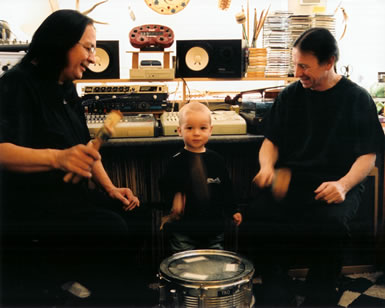
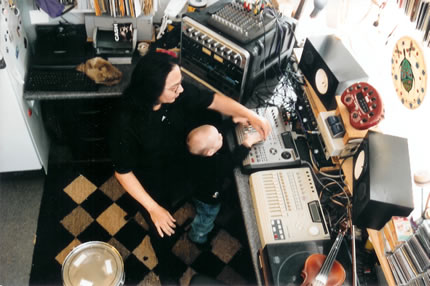
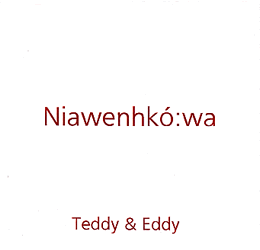 New
CD by Akwesasronon
New
CD by Akwesasronon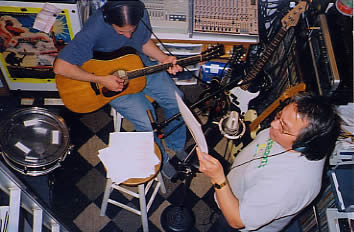 Though
modest about his accomplishment, Peters explained that he “just
sings the songs and Eddy does all the rest.” It is clear that
Peters’ love of music and his desire to promote our language is
foremost in his mind. Peters skillfully translated each song into Kanien’keha,
which is not a simple task as our language is legendary for long multi-syllable
words. Judging from Cultural Center staff and numerous favorable reviews
he has garnered, it’s clear that the CD is destined to be a hit
in all Kanien’hehaka communities.
Though
modest about his accomplishment, Peters explained that he “just
sings the songs and Eddy does all the rest.” It is clear that
Peters’ love of music and his desire to promote our language is
foremost in his mind. Peters skillfully translated each song into Kanien’keha,
which is not a simple task as our language is legendary for long multi-syllable
words. Judging from Cultural Center staff and numerous favorable reviews
he has garnered, it’s clear that the CD is destined to be a hit
in all Kanien’hehaka communities.